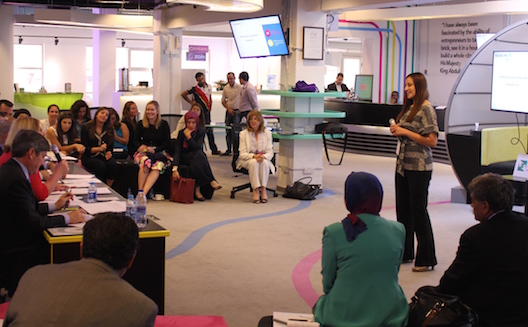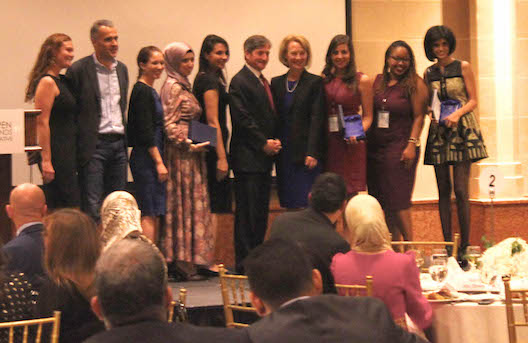Fellowship for young women entrepreneurs connects rising stars from US and Jordan


Yara Al-Khader, founder and CEO of SA3ED.ME, pitches to judges
during Demo Day at ZINC. (Images via Sam Wendel)
“Recommendation services have changed the way we find every other type of art. Music, movies, books, fashion, good food. They’ve yet to impact the way we find visual art for our walls,” said Tara Reed, her voice rising authoritatively as she addressed a panel of expectant investors, their eyes following her every move.
“At Kollecto, we’re building the first recommendation service to do just that.”
As the CEO of a rising startup, investment pitches like this are a common occurrence for Reed and other entrepreneurs.
But this was no ordinary pitch, and Reed is not your average entrepreneur.
As the female CEO of a startup, Reed and other women worldwide face numerous obstacles that their male counterparts do not. As a result, many promising and innovative businesses founded and run by women are at risk of failure - and for the wrong reasons.
Creating positive change
US-based non-profit the Open Hands Initiative (OHI) is trying to change that.
That’s why when Reed finished pitching Kollecto - an online recommendation service that comes off as a hybrid of Yelp and Spotify, but for art - the assembled investors and a crowd of female entrepreneurs sitting beside them burst into applause.
Reed had just pitched to a panel of investor ‘judges’ at the Zain Innovation Campus as part of the Fellowship for Young Women Entrepreneurs, a program designed to train, empower and connect female entrepreneurs from the United States and Jordan.
Organized and supervised by the OHI, the Fellowship for Young Women Entrepreneurs brought together 20 rising female entrepreneurs (10 Jordanian and 10 American) to participate in a cultural and educational exchange program in Amman, Jordan from October 16-24.
As an organization, OHI runs programs that seek to improve “people-to-people understanding and friendship throughout the world by fostering exchanges” between the United States and developing regions, according to its webpage. In years past, OHI has overseen similar programs in Syria, Burma, and Egypt.
"We hope that this fellowship will not only serve as a launchpad for pioneering young women to take their companies to the next level, but that it will also create new synergies and business prospects between founders from both countries,” said OHI founder and chairman Jay Snyder in a press release.
Along with partners the Angel Resource Institute, Zain, Oasis500 and others, the fellowship was a weeklong entrepreneurial boot camp including lectures, site visits, mentorship sessions and collaborative team projects.
Additionally, the entrepreneurs took excursions to the ancient city of Petra and dropped by the Dead Sea.
At its conclusion - Demo Day on October 24 - the entrepreneurs stepped into the spotlight and pitched their companies. At stake were four $25,000 prizes for the top four entrepreneurs - two Jordanian and two American - as decided by a panel of investors and mentors serving as judges.

The winners
But when it came time later that day to announce the winners at the final banquet dinner held at the Marriott Hotel in Amman, not everything went according to plan.
When OHI chairman, Snyder, took to the podium to announce the winners, he revealed that the judges - despite an intricate scoring system - had been unable to settle on only four winners.
The second place entrepreneurs for both the Jordanian and American groups had tied. In response, each second place finisher was to be awarded a $15,000 prize accordingly.
The top prize for the Jordanians went to Ekeif and its CEO Sima Najjar. Ekeif is a popular online video content platform providing short, how-to videos in Arabic for a female audience.
For the United States, Tara Reed and Kollecto (above) ran away with first place.
Back on the Jordanian side, Tala Nassraween of Solar PiezoClean tied for second place with Afnan Ali and her startup Eureka. Nassraween’s Solar PiezoClean offers a cleaning attachment for solar panels in dust-prone regions. Ali’s Eureka provides a tech education academy for children interested in pursuing engineering.
Tied for second among US entrepreneurs were Lisa Curtis and her startup Kuli Kuli and Anwaar Al-Zireeni from Privail. With Kuli Kuli, Curtis is introducing moringa - a superfood derived from a flowering plant native to Africa and Asia - to Western markets in wake of the success of other “exotic” foods like kale or quinoa. Privail is developing a point-of-care (POC) diagnostics platform for the early detection and monitoring of infectious diseases like HIV.
But second place ties weren’t the only surprises in store at the award show.
Because of her focus on the humanitarian crisis unfolding in the MENA region, Zain independently chose to offer program participant Adrienne Yandell a special $25,000 fund to use for her startup Work4Good.
Yandell’s company facilitates access to online work for Syrian refugees and the communities that host them, something that resonated with local partners.
Deep well of talent
And they weren’t done. Because of the sheer depth of talent amongst the Fellowship’s participants, OHI awarded one final People’s Choice prize.
This went to Rahmeh Abu Shweimeh and SheCab, a startup training female taxi drivers in Jordan in order to provide local women with a transport option that doesn’t include gender discrimination and harassment - common occurrences that deter women from utilizing public transport.

The winning entrepreneurs from the Open Hands Initiative's Fellowship for Young Women Entrepreneurs pose for
a photo.
And despite the monetary incentives, it’s arguable that female-empowering startups like SheCab were the true spirit and essence of OHI’s fellowship program.
“We’re here tonight to celebrate a special type of entrepreneurship, one that is crucial to economic growth and prosperity,” said US Ambassador to Jordan Alice Wells during a keynote speech at the awards reception. “Now more than ever, women are among those who are starting new ventures, opening their own businesses, and investing in new technology.”
And early results indicate the Fellowship for Young Women Entrepreneurs achieved its goal of empowering and facilitating communal ties among its participants.
When asked what the highlight of the program was, Kuli Kuli’s Lisa Curtis supplied an unexpected and revealing answer.
It wasn’t exploring the ruins of an ancient city carved into crimson cliffs, or floating in the warm embrace of the Dead Sea.
Instead, Curtis says it was watching her fellow participants take the floor during Demo Day and watching them passionately pitching their businesses after all their hard preparation.
“We’d seen little snippets of each other’s businesses,” says Curtis. “But seeing all of the women on stage today just going for it pitching their businesses, particularly the Jordanian women, was so inspiring.”


